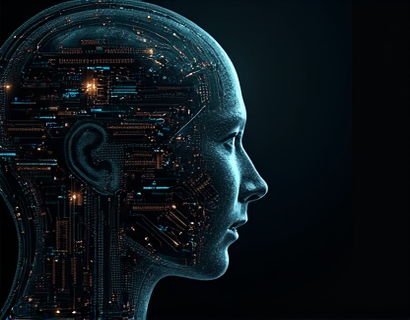Unlocking Digital Transformation: Harnessing AI and Crypto for Enhanced User Engagement in the Ucosystem
The digital landscape is rapidly evolving, driven by technological advancements that redefine how we interact with online ecosystems. At the forefront of this transformation are two revolutionary technologies: Artificial Intelligence (AI) and Cryptocurrency. These technologies, when combined, offer unprecedented opportunities to enhance user engagement, foster growth, and create more connected and intelligent online communities. This article explores the intricate ways AI and crypto can be leveraged to unlock the future of digital engagement, providing insights for tech enthusiasts and early adopters interested in navigating the cutting edge of these movements.
Understanding the Synergy Between AI and Crypto
To fully grasp the potential of AI and crypto in digital transformation, it's essential to understand their individual roles and how they complement each other. AI, with its ability to process vast amounts of data, learn from patterns, and make decisions with minimal human intervention, has become a cornerstone of modern technology. It powers everything from personalized recommendations in e-commerce to sophisticated fraud detection systems. On the other hand, cryptocurrency, built on blockchain technology, offers a decentralized, secure, and transparent way to conduct transactions without the need for intermediaries.
The synergy between AI and crypto emerges when these technologies are integrated to create systems that are not only intelligent but also secure and trustless. For instance, AI can enhance the functionality of smart contracts, making them more adaptive and responsive to changing conditions. Conversely, the transparency and security of blockchain can provide a robust framework for AI systems to operate, ensuring data integrity and user trust.
Enhancing User Engagement Through AI-Driven Personalization
One of the most impactful applications of AI in digital ecosystems is personalized user experiences. By analyzing user behavior, preferences, and interactions, AI algorithms can deliver highly tailored content, recommendations, and services. This level of personalization not only improves user satisfaction but also increases engagement and retention rates. For example, streaming platforms use AI to curate playlists based on individual listening habits, while e-commerce sites offer product suggestions that align with a user's past purchases and browsing history.
Moreover, AI-powered chatbots and virtual assistants play a crucial role in enhancing user engagement. These intelligent agents can provide instant support, answer queries, and guide users through complex processes, all while maintaining a natural and seamless interaction. This not only reduces the burden on human support teams but also ensures that user needs are met promptly and efficiently.
Securing User Data with Cryptographic Solutions
In an era where data privacy and security are paramount, the integration of cryptographic solutions is essential. Blockchain technology, with its decentralized and immutable ledger, offers a robust framework for securing user data. By storing user information on a blockchain, platforms can ensure that data is tamper-proof and accessible only to authorized parties. This transparency builds trust, as users can verify that their data is handled securely and ethically.
Furthermore, cryptographic techniques such as zero-knowledge proofs allow for verification of data without revealing the actual data itself. This means that platforms can confirm user identities or transaction authenticity without exposing sensitive information. This balance between security and privacy is crucial for fostering user confidence and encouraging active participation in digital ecosystems.
Decentralized Governance and Community Engagement
The decentralized nature of blockchain technology extends beyond data security to governance and community engagement. Decentralized autonomous organizations (DAOs) leverage smart contracts to create self-governing entities where decisions are made collectively by token holders. This model can be applied to digital ecosystems to involve users directly in the decision-making process, enhancing their sense of ownership and engagement.
For instance, a digital content platform could use a DAO to allow content creators and users to vote on features, moderation policies, and revenue distribution. This not only democratizes the governance process but also ensures that the platform evolves in line with the community's needs and preferences. Such a participatory approach can lead to higher user satisfaction and loyalty, as users feel their voices are heard and valued.
Tokenization of Value and Incentives
Cryptocurrency and tokens can be used to create incentive mechanisms that drive user engagement and participation. By tokenizing value within a digital ecosystem, platforms can reward users for contributing content, participating in discussions, or completing tasks. These tokens can serve as a form of digital currency within the ecosystem, enabling users to purchase premium services, access exclusive content, or even trade with other users.
For example, a social media platform could introduce a native token that rewards users for creating high-quality content or engaging in meaningful interactions. These tokens can be used to boost a user's profile visibility, unlock special features, or even be sold on external exchanges. This not only motivates users to contribute positively but also creates a vibrant and active community.
Enhancing Trust Through Transparency and Auditability
Transparency and auditability are key factors in building trust within digital ecosystems. Blockchain's inherent transparency ensures that all transactions and interactions are recorded and verifiable. This level of transparency can be leveraged to provide users with clear insights into how their data is used, how decisions are made, and how the ecosystem operates. For instance, a financial services platform can use blockchain to show the flow of funds, transaction fees, and service charges, giving users a clear understanding of the processes involved.
Additionally, the immutable nature of blockchain records makes it easier to conduct audits and ensure compliance with regulations. This can be particularly beneficial for businesses operating in heavily regulated industries, as it provides a tamper-proof record of their operations. By demonstrating transparency and accountability, platforms can attract and retain users who value trust and integrity.
Fostering Innovation Through Open Development
The open and collaborative nature of blockchain and AI technologies encourages innovation and community-driven development. By opening up their platforms and APIs, companies can invite developers and enthusiasts to contribute to the ecosystem, leading to a richer and more diverse range of applications and services. This open development model not only accelerates innovation but also fosters a sense of community and shared purpose.
For example, a tech company could launch a developer program that provides tools, resources, and incentives for developers to build on its blockchain-based platform. This could result in a wide array of third-party applications that enhance the core functionality of the ecosystem, benefiting both the platform and its users. Such collaboration can lead to breakthrough solutions and new business models that might not have been possible within a closed system.
Challenges and Considerations
While the potential benefits of integrating AI and crypto in digital ecosystems are significant, there are also challenges and considerations that must be addressed. One of the primary concerns is the technical complexity involved in implementing these technologies. Developing and maintaining AI and blockchain systems requires specialized knowledge and resources, which can be a barrier for smaller organizations.
Another challenge is the regulatory landscape, which is still evolving in many regions. The use of cryptocurrency and blockchain technology is subject to varying laws and regulations, and ensuring compliance can be complex. Additionally, there are concerns around scalability, energy consumption, and environmental impact, particularly with proof-of-work blockchain networks.
To overcome these challenges, it's essential for organizations to invest in research and development, build partnerships with experts, and stay informed about regulatory developments. Adopting a gradual and strategic approach to integration can help mitigate risks and ensure a smooth transition to a more intelligent and secure digital ecosystem.
Conclusion
The convergence of AI and crypto represents a transformative force in the digital landscape, offering unprecedented opportunities to enhance user engagement, security, and innovation. By leveraging these technologies, digital ecosystems can become more intelligent, transparent, and community-driven, leading to greater user satisfaction and growth. As tech enthusiasts and early adopters, embracing these advancements is not just a strategic advantage but a necessity for staying relevant in the rapidly evolving tech world.










































